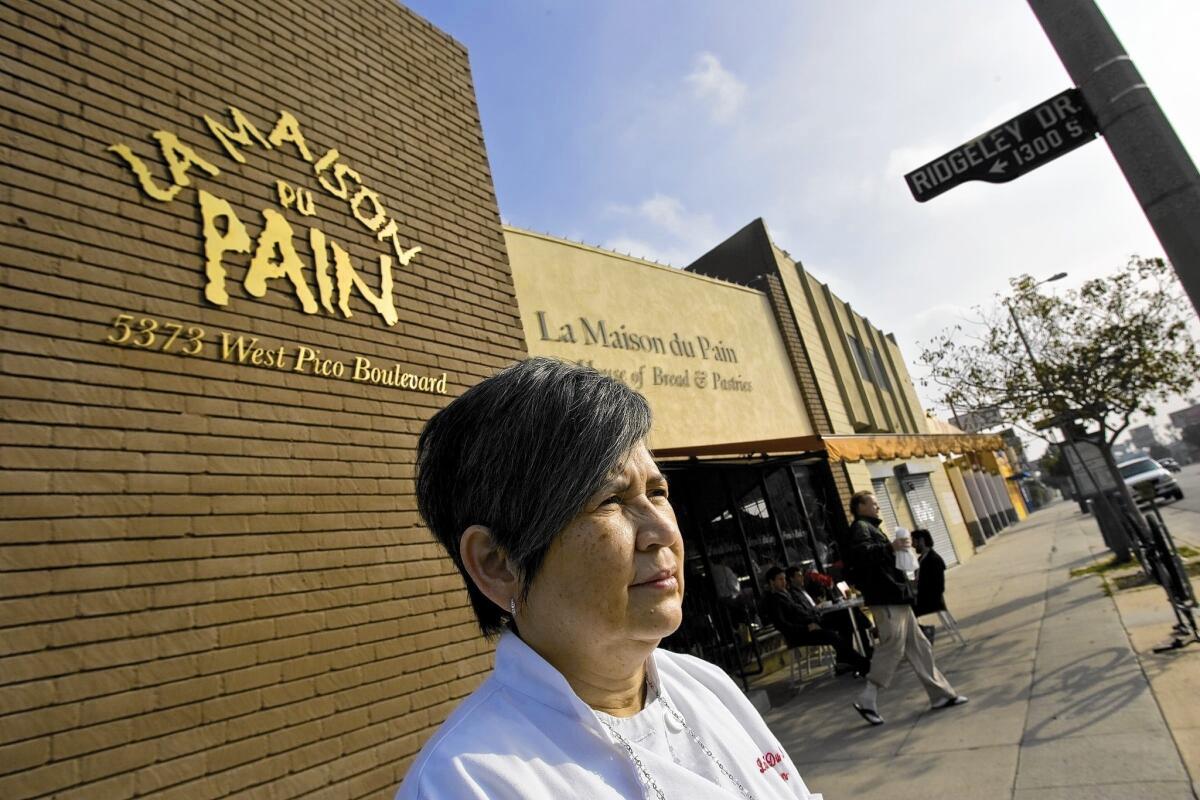Stolen funds went to trips, cars and a French bakery, court opinion says

- Share via
When Robert Smylie used to drive by La Maison Du Pain, he would recall the uplifting story behind the bustling Mid-Wilshire bakery.
His law firm’s former office manager and her sister built the business from scratch, welcoming customers on an unassuming stretch of Pico Boulevard known more for auto body shops than the fresh croissants and baguettes the women served.
The French bakery helped spur a revival of the area, attracting art galleries, trendy restaurants and imported furniture boutiques.
------------
FOR THE RECORD:
Bakery lawsuit: In the April 28 California section, two headlines accompanying an article about attorney Robert Smylie erred in stating that employees had stolen funds from him to start a bakery. Court records show only that, of the $5.3 million that Carmen Salindong and Esterlina Santos, two former employees, have been ordered to repay Smylie, at least $42,500 was spent to pay off the bakery’s credit card, not to pay for starting the business. In addition, one of the headlines erred in stating that Smylie “is nearly broke”; the article referred to an earlier period of financial distress arising from the theft.
------------
Smylie was happy for his former employee’s success, even though her business seemed to be rising in fortunes just as his was falling.
But the bakery hid a dark secret.
Without Smylie’s knowledge, Carmen Salindong and a sister-in-law who worked for Smylie had spent years embezzling more than $5 million from his law firm, using the money on lavish vacations around the world, luxury cars and the bakery, according to court records.
Smylie, 67, said the theft was discovered after he spent about 12 years on the brink of financial ruin.
Now he has turned over his financial records to the FBI, which is investigating, and the bakery appears likely to close after a judge recently ordered that its assets be sold to repay the stolen money.
Smylie said he remains angry at how the women bilked him while acting as sympathetic confidantes who listened to his financial worries. He also finds it galling that Salindong and her sister publicly presented themselves as struggling entrepreneurs living out their dream of starting their own business when the bakery was benefiting from the thefts.
“It was a wonderful story — but it wasn’t true,” he said.
Smylie left his old law partnership in the early 1990s to launch a real estate law firm, overseeing a small team of attorneys. He was joined by Salindong, who had worked at his old partnership and now served as Smylie’s office manager. Her sister-in-law, Esterlina “Lina” Santos, maintained the books.
Records submitted in court show that the thefts began in 1998. Salindong had check writing authority and used that power to approve checks that paid off personal credit cards belonging to her, her sister-in-law and their extended family, court records show.
Santos falsified the books so that the payments looked as if they were legitimate recurring expenses, such as insurance. Salindong reviewed the books before handing them over to Smylie, who has no bookkeeping skills and trusted the women. The firm’s accountants never caught on to the scheme, Smylie said.
The firm was struggling financially, and Smylie said he often confided in the women about his worries.
Smylie mortgaged his Malibu home to keep the firm afloat, then lost it to foreclosure. Meanwhile, Santos lived in a million-dollar home in Westchester.
Smylie wanted to send his daughter to a private high school but didn’t have enough money. Santos’ daughter attended the elite, all-girls Marlborough School in Hancock Park.
Smylie once sold a car to Santos’ brother. He now suspects the car was paid for with money stolen from his firm.
In 2004, Smylie let Salindong go after she fired an attorney without first clearing it with him.
Santos took over Salindong’s job while continuing her bookkeeping duties. Salindong opened the bakery with a sister, Josephine Santos, who is Esterlina Santos’ sister-in-law.
::
The sisters portrayed themselves as hard-working entrepreneurs who came to build their dream business from virtually nothing except their savings and the support of their large, extended family.
Salindong and her sister Josephine said the inspiration for La Maison du Pain, or House of Bread, came during a trip to Paris with 17 other relatives. They told the Los Angeles Times in 2005 that they had been impressed by the neighborhood bakeries, where people lined up in the early morning for their bread.
The women said they took out second mortgages on their homes, sold property and pooled their life savings to make their bakery a reality.
They imported top-of-the-line French ovens and hired a French chef. They estimated that they spent more than $1 million to get the bakery up and running.
The neighborhood rallied around the first-time businesswomen. Their arrival in 2004 coincided with a campaign by local groups to clean up the stretch of Pico Boulevard near La Brea Avenue by pushing out auto repair and tire shops and attracting restaurants and other vendors.
La Maison du Pain was one of the early arrivals and residents were delighted, said Roxanne Brown, a former resident of the neighborhood who frequented the bakery.
“There was this momentum in the neighborhood to support them,” she said. “The breads were wonderful — they were just delicious. It was like having a real French bakery.”
The business thrived in the years that followed. So did the ongoing scheme at the law firm, court records show.
::
The call that helped Smylie unravel the embezzlement came in 2010. A bank fraud investigator asked him whether the firm was supposed to make payments on personal credit cards of employees — specifically one in the name of Esterlina Santos.
To Smylie, it suddenly all made sense.
He walked over to Santos’ desk and confronted her, accusing her of stealing from him. She owned up to the theft and signed a confession, saying that she took the money to help family members who came to her with financial problems, according to court records. As she was escorted out of the office, she asked whether she could keep her job.
Smylie hired a forensic accountant to dig through records and uncover the scope of the theft.
The accountant concluded that the women stole at least $5.7 million, court records show.
It is unclear how all the money was spent. But court records show that the firm’s money was used to make payments on a Porsche and a Mercedes for Santos; trips that Santos, Salindong and their extended family took to Manila, Tokyo, London, Switzerland and other far-off locales; and a party Santos threw for her daughter at the Ritz-Carlton in Marina del Rey that cost about $150,000. At least $42,500 was spent to pay off the bakery’s credit card, according to court records.
Smylie filed a lawsuit against Salindong and Santos. During a trial in 2013, the women invoked their 5th Amendment right against self-incrimination and declined to testify, citing the ongoing federal investigation.
In previous depositions, however, Salindong claimed to have no knowledge of the fraud and blamed Santos.
Last year, Los Angeles County Superior Court Judge Lisa Hart Cole ordered the women to pay back more than $5.3 million in stolen money.
“It is clear to this court, by well beyond a preponderance of the evidence, that Carmen [Salindong] and Lina [Santos] conspired to systematically steal millions of dollars … slowly, regularly, bit by bit — death by a thousand cuts,” she wrote.
Cole wrote that testimony showed Salindong to be intelligent and tough. She answered questions confidently and knowledgeably when it was of benefit to her, but suddenly became forgetful and confused when it was not, the judge wrote.
Josephine Santos was not directly involved in the theft, the judge ruled, but she was found to be complicit in the scheme because she received money from Esterlina Santos. She was ordered to return nearly $18,000.
Salindong declined requests for comment. Santos could not be reached for comment.
Smylie has little confidence that he will regain what he lost. The women have filed for bankruptcy and a criminal investigation has been going on for years with no resolution, Smylie said.
“These people are amoral,” he said. “They’ve never apologized, they’ve never shown any form of remorse or contrition.”
Smylie said he and his attorneys have tried to reach a settlement that would have the sisters turn over ownership of the bakery. Smylie hopes the business can stay open under the same name. So far, the sisters have refused, he said.
If no agreement is made, the bakery will probably close, and the French oven and other equipment will be sold off piece by piece.
More to Read
Sign up for Essential California
The most important California stories and recommendations in your inbox every morning.
You may occasionally receive promotional content from the Los Angeles Times.











